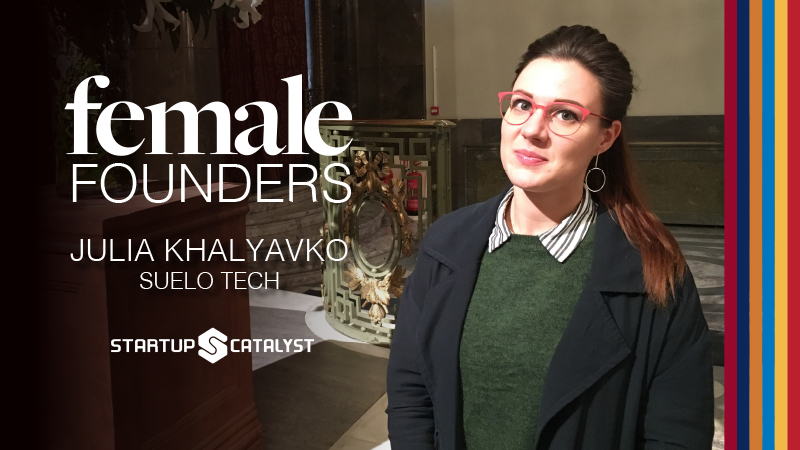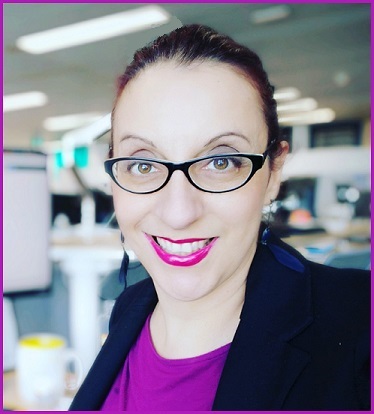Welcome to ‘Female Founders’, the Information Age series profiling 12 women who have grabbed the entrepreneurial reins and ridden into the unpredictability of start-up life.
We talk to the women about their business, entrepreneurship journey and advice they’d give to other women considering starting their own business.
Information Age interviewed all 12 women on the Start-up Catalyst Mission to London this year. Start-up Catalyst runs regular missions for start-ups, investors, and other leaders to some of the world’s top tech hotspots, such as Silicon Valley, Israel, Hong Kong and London. The goal? To transform both the individual and innovation landscape in Australia.
Today we speak with Julia Khalyavko, co-founder of Suelo Tech.

Name: Julia Khalyavko, co-founder
Business: Suelo Tech
Established: 2019 in Brisbane
No. of employees: 2
No. of customers: 0
Information Age: Tell me about your business.
Julia: Suelo Tech is a social enterprise start-up – we’re developing technology for small scale ecological farmers to help them better compete with industrial agriculture.
IA: How did the idea for your business come about?
Julia: I'm not an idea person. I'm an executor and you need to give me an idea for me to become skilled in it. My friend from uni had this idea for an agricultural start-up about a year ago and approached me about it.
My co-founder had a bit of the agricultural experience but I didn’t know anything about the industry. It took five to six months to map the industry out, to understand its sectors, pains, gaps to work out what we could invent and for whom.
We came to the conclusion that small-scale ecological growers are the most marginalised in the industry because they’re not using any pesticides and herbicides. They're not damaging the soil by using different damaging farming practices. They don’t play by the rules of the big game which is industrial agriculture.
IA: What problem does your business solve?
Julia: Combatting climate change. [laughs] Imagine changing the world!
Industrial agriculture is defined by its heavy use of pesticides which degrades the soil and so the soil is unable to store carbon deep beneath the surface. Soil is the biggest carbon sink in the world after the ocean. The presence of carbon in the atmosphere is the biggest driver of climate change. Agriculture is not the worst industry contributing to climate change but it's one of the major ones.
The grand idea is to change the industrial way that food is being produced by using ecologically sustainable farming practices. They're called regenerative agriculture practices. What they do is regenerate soils.
What the technology does is collect data using IoT sensors. It takes data from the soil and combines it with the information about the macro and micro climate. It looks at temperatures, humidity, moisture, and UV radiation. It combines all those big sets of data, analyses it and tells that farmer what's going on the soil and how to improve it.
IA: How is organic agriculture different to what you’re doing?
Organic is the absence or very little use of pesticides and chemicals, and low use of damaging practices.
Regenerative agriculture is not only the eradication of all of these but also working with nature and mimicking it. It’s using practices such as crop rotation and cover crops.
Let’s say you have some land that you decide not to use for farming this particular season. A cover crop is planted on the soil to prevent carbon being pushed back into the atmosphere. When it comes to soil and agriculture, photosynthesis is the major process that helps carbon get back into the soil and stay there.
IA: What’s been the biggest challenge you have faced so far with your business?
Julia: There are always a lot of challenges. The first one is technology because we do both hardware and software. Hardware is difficult – you think you can develop something and once you develop it, you test it, and find it doesn't work. So you redesign it, and it still doesn't work. Development and testing takes time, and I'm not a technology person.
This is the second type of challenge -- I'm not a technical co-founder. I have a co-founder who's a tech person. And I'm certainly way techier than I was a year ago when we just started.
But it's still not enough, I can't develop the technology. That’s the biggest challenge for me because even though I'm learning, it's still not enough. I have a basic understanding of how the technology works and what we have to do to take it to the next level.
I recommend doing your due diligence on the tech front. If you need to learn how to code, go and learn how to code at least for your own general understanding of what it takes. I'm the person who wants things now, in fact, I wanted it yesterday. The development process takes twice as long as what you planned.
For my understanding, that wasn't clear to me when we started and that's why I was very impatient. Once I started diving deeper into technology development, I realised it wasn't that easy.
IA: Given it has been quite complex at times, have you ever wanted to throw the towel in?
Julia: Of course. I've lost count how many times!
I keep going because I’m very dedicated to whatever I decide to be dedicated about. To be completely frank, I was never passionate about agriculture before we started it because I didn’t understand what it was all about.
Now that I understand how it's interconnected with social processes and how it impacts climate change big time, it makes total sense to me.
IA: What vision do you have for this business?
Julia: A very grand vision – we want to change the world. [laughs]
We want to start small for those growers and farmers who already share our ideology to build a customer base and trust, to build the evidence showing the benefits of regenerative agricultural practices, that they work, that they increase production and help with soil health.
Once we are successful, we’d like to take it to the greater agricultural world. We know that there are a lot of industrial farmers who are interested in this. The problem is that if you've been farming for 30 to 40 years using the same principles and the same guidelines and it's been working for you – and you do understand how toxic it is to the environment -- at the same time you’re afraid of losing your business if you start implementing new practices.
Another angle that what I would like Suelo Tech to be involved in is talking to people who live in big cities about the importance and interconnectedness of agriculture with every single sphere of their life.
IA: Which international markets would you'd like to enter first?
Julia: There's quite an extensive agricultural scene in the UK. I hadn't really looked into it before coming to London. My focus was around sustainable food alliances and groups.
Before coming to the UK, I would have said India, as it’s an extensive market and my co-founder is Indian. Then China and the whole of Latin America.
IA: Do you have any plans to raise capital?
Of course, we’ve been solely bootstrapped to date!
But we still have to prove the product works. We are developing something that hasn’t been invented before. We need to deliver on our promises.
You can’t take someone’s money without evidence that it works.
IA: When do you hope to have a minimal viable product (MVP)?
That’s probably a year away.
There are three phases of the product development. The first one is one type of sensor, the second one is the second type of the sensor – which is micro climate, nutritional profile – and then the system itself.
In Silicon Valley, there are cases of people getting funding from investors by just selling them the idea or the vision. In Australia, that's not the case. Investors need to see the traction, whatever it may be. They need to see evidence that it's working, that it will deliver what you are claiming it will deliver.
We don't have this yet – this is just the reality that we live in.
IA: What did you do before you were a business founder?
Julia: I was doing my Masters in Public Policy and Governance. I did my undergraduate degree in national relations and I thought being on United Nations panels was the way to go. That's how we change the world.
When I studied national relations I realised that the world doesn’t work that way and that I should maybe narrow it down to the local level, which is public policy.
But it ruined my faith in politics – not in politics per se, but in it being the tool of bringing about the change.
My dad has been an entrepreneur his entire life. Now he has his second major business. I feel like business or entrepreneurship is a much faster way, much more efficient tool, for changing anything that you want to change.
IA: Would you credit your dad with putting you on the path to entrepreneurship?
Julia: No. When I was doing my Masters, having completed my first year out of two, I started taking electives. I was given a chance to start taking electives from different schools. For some reason, I was like, "Yes well, business school. Why not?" Then I just went through the list of the courses that I could take and noticed social entrepreneurship.
Social entrepreneurship is about a business that makes money and also does good. I thought, “How is a business supposed to be doing good when a business is supposed to be making money?’ It didn’t make sense to me. Then two lectures later, it became my favorite subject. I remember thinking, "Well, that's how you bring about change."
After that I just started taking other business-oriented electives from the business school. I realised that was the thing that I'd been looking for my entire life.
IA: What advice would you have to female founders who are on their entrepreneurial journey?
Julia: In what I've seen so far when it comes to start-ups is that the most efficient founders are ones who are trying to solve problems in a sphere they're familiar with.
Coming into the agricultural sphere, as a total stranger, look how much time it took me to understand what it was all about!
If it’s in an area you’re unfamiliar with, that's going to be much harder.
I also work another job. I’m a commercial analyst at Commit Works which develops planning and scheduling management software for mining sites.
I just calculated recently and I basically have two full-time jobs. I work almost 80 hours a week. I really need to find an investor who wants to pay me a salary while I'm developing Suelo Tech!
Roulla Yiacoumi travelled on the 2019 Startup Catalyst Mission to London with the Female Founders.










